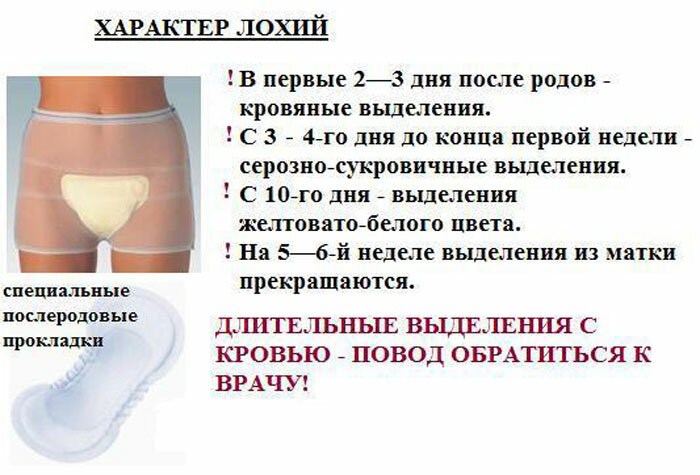The body of each woman is individual, and this applies to all the moments, including recovery after childbirth. Often, young mothers are interested in when the monthly will again go during breastfeeding. Normal terms have a fairly wide range of fluctuations, which is affected by the nature of lactation. But even if the menstruation has not gone yet, you can get pregnant at any time. What should be the monthly after childbirth, what does it affect, when should I worry?
Normal timing for recovery of the cycle
Bloody discharge that appears in women immediately after childbirth, can not be considered monthly. These are the lochia, which are represented by the remains of fetal membranes, mucus, blood, etc. On average, they last about a month( but not more than 42 days), gradually decreasing in volume. In the last weeks or days, it's just mucus with blood veins.

The fact that the girl had a natural birth or had a cesarean section, for months, practically does not affect.
If there is no breastfeeding
If for some reason the girl does not have lactation, menstruation may appear after 1.5 - 2 months after childbirth. In this case, their nature and duration may differ from those customary for it. Menstruation is both meager in the first month, and too abundant. The latter is more often observed after cesarean section.
Within 6 - 8 months, a normal rhythm of menstruation should be established. At the first time they can come with delays or, on the contrary, more often.
Ideally, the monthly after delivery without breastfeeding should be adjusted for 3 - 4 months, be normal in duration and cyclicity.
It should be borne in mind that the next pregnancy can occur one month after the birth, if not maintain lactation. That is, before the onset of the first menstruation, as ovulation occurs in advance.
When feeding on demand
On whether the menstrual period occurs while breastfeeding, some factors influence. This method is popular today, it is also advocated by WHO.The basic rule is to apply the crumb as often as possible, with every waking, crying, etc. Including night feeding - every 1 - 1.5 hours.
To maintain such lactation, a high level of prolactin in the blood remains. Therefore, menstruation in 90% of cases begins in women closer to 7 - 8 months of the baby, when introducing lures and the role of breastfeeding is not so great.

But the fact that girls do not have a period for so long does not mean that they can not become pregnant. Indeed, when feeding on demand, the chances are small, but still there is. It is not known when the first menstruation will occur.
With partial lure
It happens that the milk of a woman is not enough, then you have to feed your baby with artificial mixtures. In such situations, the production of prolactin in a girl is reduced, and, accordingly, it does not actively suppress ovulation and cyclical changes in the endometrium.
Based on this, with partial lure( 1 - 2 times per day), the menstrual function can be adjusted already for 3 - 5 months even if all the rules of lactation are observed.
It should be borne in mind that the monthly may be irregular in this case, the volume of lost blood can also vary.
Some girls undergo a complete cycle recovery even during lactation, while others may continue to fail throughout the whole period of feeding. Both are a norm that should not cause anxiety.
When feeding on the clock
This method of breastfeeding was popular in the Soviet times, when it was strictly regulated that it was necessary to apply the baby to the breast every two hours. And then, from two to three months of age, start making big breaks at night.
If you adhere to these principles, intervals of 3 to 4 hours at any time of the day will provoke a decrease in the production of prolactin. As a result, the level reaches the values when the maturation of new follicles does not stop, ovulation occurs, and menstruation appears again. In such women, critical days usually begin 5 to 6 months after childbirth. A new pregnancy can occur after 3 - 4, so you need to be vigilant in matters of contraception.
Look at the video about menstruation in lactation:
Influence of menstruation on HS
Many girls are worried that if during breastfeeding months have begun, the baby will refuse to suck, or he will not like milk.
In fact, there are no reliable data confirming these facts. And according to the observations of moms, not all had any changes in the return of menstruation.
But if this did happen, more often the following was noted:
- The amount of milk in the chest decreased somewhat. This can cause the crumb to be agitated, cause his anxiety, sleep may break( it becomes intermittent, since the baby has to suck harder, and he does not immediately eat).To cope with this problem it is possible, drinking more liquid and using various teas and dietary supplements to stimulate lactation.
- At normal quantity of milk the child for some reason refuses a breast. And, consequently, he is hungry and anxious. This can be caused by the activation of the work of the sweat and sebaceous glands that are in the area of the areola including. A new smell does not always "like" crumbs, why it can not be so intense. You can cope with this by more carefully performing hygienic procedures with the mammary glands before each feeding.
- Sometimes women note that during menstruation, they increase the sensitivity of the nipples. Indeed, this can be, but you should be patient with your baby and give him plenty to eat.
Is it possible to become pregnant with lactation
Many women are convinced that during lactemia it is impossible to conceive. That's exactly what the children-pogodki appear in the family. In fact, it is almost impossible to determine exactly when the first ovulation will occur.
It is believed that pregnancy is excluded if the mother feeds her crumb every 1.5 to 2 hours, including at night. But when introducing complementary foods, you should be careful, since the level of prolactin is already beginning to fall.
In the following situations, the likelihood of pregnancy increases:
- When during breastfeeding, menstrual periods occur. This suggests that ovulation is already taking place, hormonal profile is being established.
- If the gaps between feeding more than 2 hours or longer breaks at night.
- In the case when it is necessary to feed the child with a mixture with a lack of milk.
- After the introduction of complementary foods.
- If there were cases of children-weather in the family, it may be a physiological feature of the early recovery of the female body.
Monthly started, but irregular - do I have to worry?
Often, girls are concerned about the fact that during breastfeeding they went monthly, but the cycle was not adjusted. It should be borne in mind that not only lactation affects these processes. After giving birth, much of the woman's body changes, sometimes she does not pay proper attention to this.
Normally menstrual function should be adjusted within 6 - 8 months after the first menstruation. But if a woman continues to feed her baby, then it is possible that failures will occur throughout the lactation.
The following factors should be considered when analyzing the causes of irregular menstruation:
| Factor Why it happens | |
| Body weight | It is not always possible to come to your usual weight category at once. More often women gain excess, rather than excessively lose weight. But both can lead to malfunctions and irregular monthly. The fact is that fatty tissue plays an important role in the metabolism of sex hormones. With increased body weight, there is an excess of estrogens, with deficiency - a defect. Hence the problem. |
| Stress, lack of sleep, limited and monotonous nutrition | After birth, especially the female body is sensitive to all sorts of troubles, which can have an effect on the functioning of the genitals. As soon as the girl begins to fully rest, sleep at least 6 - 8 hours / day, everything comes into balance. Help to do sports, relaxing yoga practices, breathing exercises, etc. |
And if it's not a monthly
Any girl should know that, besides monthly, after the birth, various kinds of bleeding or daub can occur. Sometimes they seriously threaten the life of a woman.
Should pay attention to such situations:
- If within 42 days after giving birth a woman suddenly has a sudden abundant discharge. Especially with clots or accompanied by pain, fever and other symptoms.
- In the case when spotting( even smearing) goes constantly or periodically without any pattern more than 42 - 45 days after delivery.
- If the months are very abundant, within an hour you have to change 2 or more maxi-pads. But here it should be borne in mind that the first few months after the birth of menstruation can be much larger than before pregnancy. Gradually, the volume of lost blood will return to normal. Sometimes this takes up to six months.
- If a woman has uterine fibroids or performed any additional manipulations during labor( caesarean section, curettage cavity, etc.), and against this background there are abundant spotting that can be accompanied by pain.

We recommend reading the article about restoring the cycle after childbirth. From it you will learn about the causes of the malfunction, the timing of the onset of menstruation, if a woman feeds or does not breastfeed, what to do if the cycle does not return to normal.
The body of each woman is restored after giving birth in different ways. Therefore, one should not ask why the months started during breastfeeding, because this is quite normal. The prevailing view that a child does not want to eat milk during critical days, or it changes its properties, is not reliably confirmed. Monthly after birth does not always have the usual duration and volume for a woman, many factors affect this, including the lactation process itself.
If you have any questions or concerns about a disease, you should consult your doctor. Only he can correctly understand the situation.

